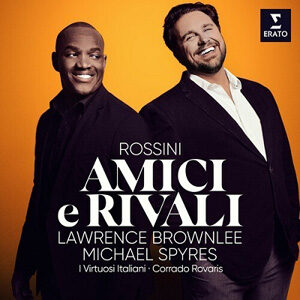This is the CD I only could have dreamed about in the 1970s. When the bel canto revival began in the ’50s, it was led by sopranos and (occasionally) mezzos. After the “usual suspect” operas were revived and recorded–Barbiere, Cenerentola, L’elisir, Lucia–one began to wonder about Donizetti’s other 65 operas and why Rossini was long considered the ne plus ultra of his era. “Private” recordings of Zelmira, La gazza ladra, Armida (in a well circulated, poorly recorded performance starring Maria Callas) became available, and it was difficult not to notice that when soprano and tenor were supposed to be singing parallel lines or when the tenor was called upon to mimic the soprano’s vocal line, we heard either a seriously abbreviated/simplified version or a pathetic attempt at coloratura, lines smudged.
A look at the scores shocked me. Tenor arias were excised or abbreviated in performances. Particularly in the Rossini operas, the tenors not only had more coloratura, with more 16th and 32nd notes, roulades, and wild fiorature than the women, but their line was often a third higher than theirs. (This is true in the few operas of Bellini as well.)
Bel canto had gone out of style in the 1850s, to be replaced by the more expressive Verdi roles and then the exclamatory works by the verismo composers, all of whom simultaneously were composing for more, and modern, instruments. Larger orchestras and more diverse subject matter required bigger voices, and vocal lines for tenor tended to stop at B-natural (there was room occasionally for an interpolated C) and were delivered solely from the chest, rather than in head or mixed voice. And so by mid-20th century the art of bel canto, at least for male voices, was gone; eventually, exclamation was king.
The bel canto roles were delegated to “light” tenors (of the Ernesto, Nemorino type) who tried hard, some almost succeeding (Pietro Bottazzo, Mario Fillipesci, Gianni Raimondi), but most of whom would rather have been singing Rodolfos–and they sounded like it. Somewhat later, the world of Rossini bel canto welcomed the fine, agile Raul Gimenez, Bruce Ford, and Ramon Vargas, and the amazingly agile but hardly “bel” tenors, Chris Merritt, he of the gigantic, ugly voice, and the far more graceful and stratospheric Rockwell Blake, who sounded, at times, like a musical typewriter.
Particularly during his tenure in Naples, Rossini had been lucky to have two amazing tenors, Andrea Nozzari and Giovanni David, at his disposal: David had an amazingly agile lyrical tenor voice that was comfortable around B-flat, B natural, C, and above; Nozzari’s voice was darker and sat lower, though he could fly into the stratosphere when needed and in a more heroic mien.
The sole excerpt here not from Rossini’s Naples days is from Il barbiere di Siviglia, with the lower-sitting, darker-voiced Michael Spyres taking the baritone role of Figaro and Lawrence Brownlee, with his brighter, very lively sound, as Count Almaviva. This has been attempted before, but as a gimmick: Here we get simply great integrated singing, roulades perfectly in sync. It’s witty, musical, and, with the very basic differences in the two men’s voices, almost entirely convincing.
Back in tenor territory in Ricciardo e Zoraide, Brownlee is joined by another fine, supple tenor, Xabier Anduaga, (who later returns for excerpts from Otello and Armida). The first duet’s stretta (track 3), just for Brownlee and Anduaga, is off to the races; if you’ve heard more accurate, textually pointed, faster, higher tenor music, let me know. The final moments of its first section are simply gorgeous legato contrapuntal singing. The lively stretta is heroic and filled with high Bs, Cs and Ds, fully integrated and never sounding like yelps. Thrilling. La Donna del Lago gives us a stunning, pastoral duet, complete with storm clouds, for Brownlee and mezzo Tara Erraught, all elegance until true tension; another tenor, this time Spyres, enters and the two men swap high Cs in a startling show of Alpha Tenor behavior while Erraught’s middle voice is handsomely highlighted.
The brief, dramatic duet from Elisabetta, Regina d’Inghilterra, one of Rossini’s “hidden” operas (save for the aegis of Leyla Gencer in the ’60s), seems to start what might be the second half of a concert–handsome singing in thirds by our two stars. The Otello highlights really do whet the appetite for the whole opera–it was (quite properly) eclipsed by Verdi’s but is a dazzler unto itself. High drama between Otello and Iago (here, Anduaga) gives way to the text “O barbaro tormento” with the trio of Spyres, Brownlee (now Rodrigo), and Erraught an impassioned Desdemona singing with such visceral excitement that it will leave you breathless.
The only solo on the CD is given to Brownlee as Néocles in La Siège de Corinth. It is a wild, furious prayer (when is the last time you heard those two words together?), and goes right into the dramatic three-way recit in which he is joined by Spyres and Erraught in attempting to unravel the miseries of the plot. The trio that grows organically from the conflict, in which the three realize that they will meet in heaven, is one of Rossini’s great creations, and it is ravishingly sung here.
How to end a recital like this? Let all the animals out of their cages: three high-flying tenors exulting in their heroism, both spiritually and vocally, with Rossini’s already maniacal vocal lines embellished and raised up. You’ll have trouble catching your breath. Embellishments, incidentally, abound even here in music that might not need any, but how thrilling they all are! Corrado Rovaris and his I Virtuosi Italiani demand laurels for taking on this music with great seriousness while at the same time exulting in its sheer entertainment value and athleticism. Rock on!
































